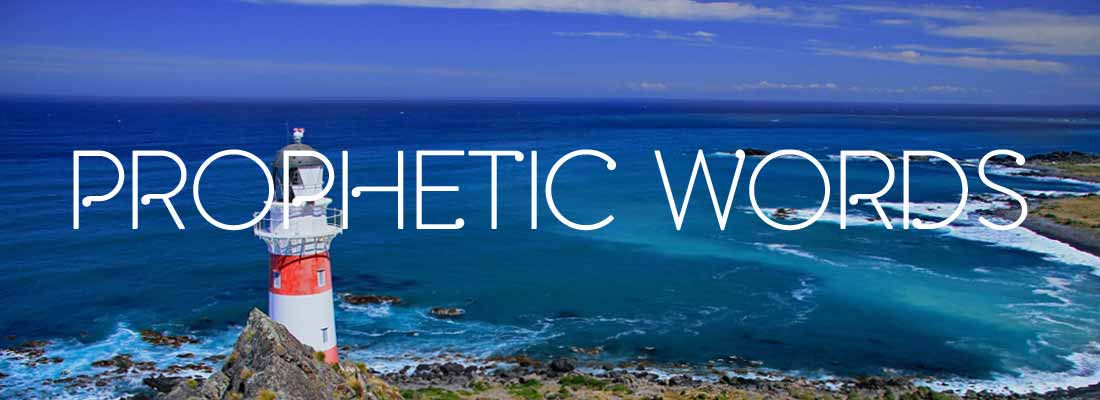PROPHETIC WORDS
A NEW GENERATION OF FREEDOM FIGHTERS
by Nathan Shaw
January 2019
Christians are called to be peacemakers (Matthew 5:9). A peacemaker is often required to confront various people and situations. One of the biggest confrontations in the Bible was between Elijah and King Ahab. Elijah confronted Ahab directly. He boldly declared that there would be no rain except at his word. No rain meant no harvest. No harvest meant no provision. The confrontation was over Israel’s source of provision. There were two options: Baal, the god of the storm cloud, or Yahweh, the God who rides the clouds (Deuteronomy 33:26, Psalm 68:4). Israel had fallen to the worship of Baal and looked to him as their source of provision.
Two Seats of Government: Heavenly and Earthly
When Elijah confronted Ahab there was a clash between two seats of government. Elijah stood before God and His heavenly court. Ahab presided over an earthly court. Elijah came from the heavenly court and addressed the earthly court: And Elijah the Tishbite, of the inhabitants of Gilead, said to Ahab, "As the LORD God of Israel lives, before whom I stand, there shall not be dew nor rain these years, except at my word" (1 Kings 17:1).
A seat of government is concerned with the provision and protection of its subjects. Rain meant harvest and provision. No rain meant no harvest and no provision. That’s why Ahab referred to Elijah as the troubler of Israel. Ahab was in fact the true troubler of Israel. He was the one who allowed Queen Jezebel to promote the worship of Baal (1 Kings 18:17-18).
There were two groups of prophets in Israel at the time. The false prophets numbered 850. The true prophets numbered only 100. 400 of the false prophets ate at Jezebel’s table. In contrast, the true prophets were hidden in caves with only basic rations (1 Kings 18:4, 19).
Two Mountains: Carmel and Horeb
After three years of no rain, Elijah confronted not only Ahab, but also the false prophets and the entire nation. The place of the confrontation was Mount Carmel. The challenge: To call down fire on a sacrificial animal. The false prophets were given plenty of time to beseech Baal. Regardless, there was no fire, not even a spark. Elijah called on the Lord and fire instantly consumed his sacrifice. The prophets of Baal were seized and killed. Rain clouds started to gather. Elijah went to confront Jezebel herself but was overcome with fear and fled for his life (1 Kings 18:1-19:3).
Elijah believed he was the only true prophet of God in Israel (1 Kings 18:22, 19:10, 14). He seemed unaware of the 100 prophets hidden in caves and the 7000 Israelites who did not worship Baal (1 Kings 19:18). If Jezebel couldn’t destroy the true prophets the spiritual force that she wielded worked to isolate them from each other. If Elijah knew that he wasn’t alone, would he have successfully defeated Jezebel? Defeating Jezebel would have been a great victory, but another question needs to be asked. If Jezebel was defeated, were the righteous ready to fill the vacuum? When there is a vacuum in spiritual government it needs to be filled. If the righteous were not ready another Jezebel could have risen, possibly even worse than the first one.
Elijah fled to Mount Horeb where he met with God. God commissioned him to anoint Hazael as king of Syria, Jehu as king of Israel, and Elisha as a prophet in his place (1 Kings 19:3-17). The right freedom fighters needed to be in place to bring about a complete victory over Jezebel. The commissioning of freedom fighters was as important as the direct confrontation that happened at Mount Carmel. Carmel was about confrontation. Horeb was about commissioning.
After the defeat of the prophets of Baal at Carmel there was a significant change in the spiritual atmosphere over the nation. True prophets were able to come out of hiding (see 1 Kings 20:35, 41, 2 Kings 2:3, 5, 7, 15, 4:38, 6:1). At the time Elijah didn’t understand the significance of the victory. He was too overcome with fear and fleeing for his life. Victories can often look like defeats and defeats can often look like victories. Elijah’s confrontation of the false prophets at Carmel led to his encountering God at Horeb. The mandate Elijah received at Horeb led to the commissioning of a new generation of freedom fighters.
Understanding the Times
Huge confrontations are happening in the nations of the earth. It is a strategic time. Many things that appear one way will turn out to be completely the opposite. Only those who correctly discern the clash between God’s heavenly court and the respective earthly courts will interpret events correctly. Confrontations are necessary, but don’t miss the commissioning that is also happening. In the midst of chaos, confusion, and partial victories, God is anointing and commissioning a new generation of freedom fighters.
BIO
Nathan Shaw helps bring individuals and churches into dynamic encounters with God's indescribable love. Nathan's passion is to equip churches so that they can move in the Spirit, access heavenly realms, encounter God's heart and release His Kingdom on the earth. Over the last twenty years he has been instrumental in ushering in significant moves of the Spirit in over ten different nations. Many have experienced life changing prophetic encounters and dramatic visitations from God. Nathan is the author of two books: Passion and Fire and Unto the Least of These and he is the senior pastor at Fire and Destiny Centre www.fireanddestiny.org, Dunedin and Celebration Church, Mosgiel www.celebrationchurch.xyz.
For More info...


